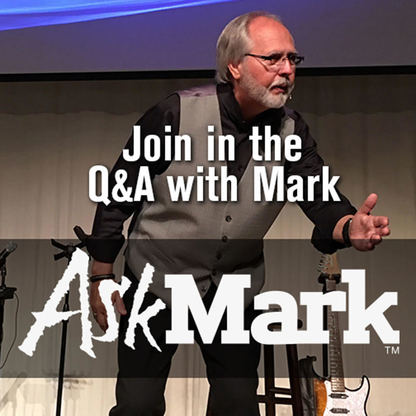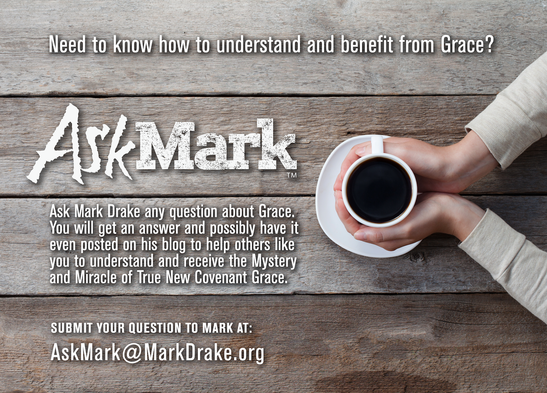Demand or Promise - What Did Jesus Mean By "If you love me, you will keep my commandments"?4/2/2018 We have been asking you to submit questions for Mark to answer as part of the new AskMark section of our site, and a few of them we are featuring here in the blog. Here is a recent question I think many Christians struggle with. YOUR QUESTION: I wonder why Jesus spoke some "law oriented" verses in NT. For example, John 14:15 "If you love me, keep my commandments." I assume the answer is Jesus was alive at that time or he was talking to his "law oriented" disciples or Paul was not there yet to start the Grace gospel. Can you help? Jim from PA MARK'S RESPONSE: Thanks for helping other people who are wondering the same thing. Your question about why Jesus made so many statements that seem to not only be reinforcing the Law, but raising the bar far higher than Moses did, is very common. In fact, it's one of the most asked questions in our pastors equipping seminars in nations around the world. I realize you were writing from memory, but it's important to note that what Jesus actually said was, "If you love me, you will keep my commandments." I point this out because, as we will see later, this is actually a promise rather than a demand. Think of it as a doctor saying, "If you will take your medicine, you will get well." It's all about cause and effect. So let's wade in. Jesus Was Born Under the Law First, we need to see that Jesus was deliberately "born under the Law." Gal 4:4-6- "But when the time had fully come, God sent his Son, born of a woman, born under law, 5 to redeem those under law, that we might receive the full rights of sons." NIV
This helps us understand that some things Jesus taught were true "under the Law" and some things He taught were to prepare people for the coming of the New Covenant. It is popular to teach the "Sermon on the Mount," Matt. 5-6, as commandments we are supposed to keep if we are going to obey the Lord. But, most of those things are impossible unless we are empowered from within by the indwelling Spirit which only comes through the New Covenant. It is clear that some things He taught were never meant to be taken as commands in the New Covenant. Things such as "If your eye offends you, cut it off...if your hand offends you, cut it off," were never practiced by the people who heard Jesus say them. We have no reference to any one-eyed or one-handed disciples. They understood what was metaphor, what was a command/demand/threat under the Law, and what was actually a promise to be fulfilled by the Holy Spirit in the New Covenant. Your reference to John 14:15- "If you love Me, you will keep My commandments," is a prime example of how easy it is to interpret certain verses as commandments, demands or threats, when we should see them as promises that only the Holy Spirit can fulfill in and through us. Problems with Communication Much of human communication is nonverbal, coming through facial expressions, cadence and inflection of voice, and movement of the body, especially our hands. A simple example can be found in these seven words- "I didn't say I beat my dog." Because you can't hear me say each word, I will emphasize them with bold type and underlining each word. Say each sentence and emphasize the bold, underlined word. "I didn't say I beat my dog." "I didn't say I beat my dog." "I didn't say I beat my dog." "I didn't say I beat my dog." "I didn't say I beat my dog." "I didn't say I beat my dog." Each sentence has the same words but each one means something very different. Our challenge is we weren't there to hear Jesus say these things. So we must pay close attention to the context, the words before and after, of each verse we read. This way we can get a much better understanding of what was intended, whether it was meant to be a command, demand, threat or a wonderful promise. Threats, Demands or Promises? So what did Jesus mean when He said, "If you love Me, you will keep My commandments"? Did He mean, "If you love Me, you better keep My commandments"? Or did He mean, "If you love Me, you prove it by keeping My commandments"? Or did He mean,"If you love Me, I will measure it by how well you keep My commandments"? Each of these interpretations sound like a command, demand or threat. But He actually gave this as a tremendous promise by meaning, "If you love Me, you will be empowered to keep My commandments." And we can be certain this is what He meant by reading the larger context. If we read vs.15, and keep on reading, we see the promise of His empowerment that would come in the New Covenant- John 14:15- "If you love Me, you will keep My commandments." If we keep reading, we begin to understand that Jesus was actually introducing the heart of the New Covenant. 14:16-18- "I will ask the Father, and He will give you another Helper, that He may be with you forever; 17 that is the Spirit of truth, whom the world cannot receive, because it does not see Him or know Him, but you know Him because He abides with you and will be in you. 18 "I will not leave you as orphans; I will come to you." From the context we can clearly see the promise of the New Covenant and how we will empowered from within. Let's fully Jesus' thinking from what He actually said- "The Father will give you another helper...the Spirit of truth." Who will help us? The Spirit of Christ. What will the Spirit do? He will lead us to truth and help us. Help us do what? Keep His commands. "...you know Him because He abides with you and will be in you." The Spirit will no longer be "with" God's people as in the Old Covenant. But He will live IN us and empower us from within. This is the true New Covenant, "Christ in you, the hope of glory." Col 1:26-27 "I will not leave you as orphans; I will come to you." Jesus will come and live in us by the Spirit. Old Testament Promises Fulfilled The New Covenant was promised throughout the writings of the Old Testament prophets, It is based on this most important promise- that God will put Himself, by His Spirit, inside us who believe. This most important promise is wrapped in understanding the difference between the simple concepts of "ON" and "IN." The Old Covenant was described as God's laws written "ON" stones. But the New Covenant is understood as the amazing promise that the Lawgiver will live "IN" people! Jer 31:31-34: "The time is coming," declares the Lord, "when I will make a new covenant with the house of Israel and with the house of Judah. 32 It will not be like the covenant I made with their forefathers when I took them by the hand to lead them out of Egypt, because they broke my covenant, though I was a husband to them," declares the Lord. 33 "This is the covenant I will make with the house of Israel after that time," declares the Lord. "I will put my law in their minds and write it on their hearts. I will be their God, and they will be my people. 34 No longer will a man teach his neighbor, or a man his brother, saying, 'Know the Lord, 'because they will all know me, from the least of them to the greatest," declares the Lord. "For I will forgive their wickedness and (I) will remember their sins no more." NIV --Notice all the times God says, "I Will." These are His New Covenant promises to us! Ezek 11:19-20: "I will give them an undivided heart and put a new spirit in them; I will remove from them their heart of stone and give them a heart of flesh. 20 Then they will follow my decrees and be careful to keep my laws. They will be my people, and I will be their God." Ezek 36:26-28: "I will give you a new heart and put a new spirit in you; I will remove from you your heart of stone and give you a heart of flesh. 27 And I will put my Spirit in you and move you to follow my decrees and be careful to keep my laws. 28 You will live in the land I gave your forefathers; you will be my people, and I will be your God." --Take note of the result of His Spirit being put IN us. He will "move us" to follow His decrees. This is the important "cause and effect." These verses in Jeremiah and Ezekiel are quoted repeatedly by the writers of the epistles; several times in the letter to the Hebrews, only. The apostles understood that in the New Covenant, the indwelling Spirit of Christ would empower believers to obey the Lord. They saw all the biblical injunctions to "obey His commandments," not as threat or demands, but as magnificent promises of what the Holy Spirit would empower believers to do. 2 Peter 1:4-5: "For by these He has granted to us His precious and magnificent promises, so that by them you may become partakers of the divine nature, having escaped the corruption that is in the world by lust." NASU --What a magnificent promise, that we "may become partakers of the divine nature." --Even Moses prophesied that after the Lord dispersed the tribes among all the nations, which happened three times by the end of Old Testament times, God would then do something within His people, something that would miraculously change the hearts of all believers. Deut 30:6: "The Lord your God will circumcise your hearts and the hearts of your descendants, so that you may love him with all your heart and with all your soul, and live." NIV --This prophesies the internal work of the New Covenant. --Isaiah prophesied again and again about the coming of the Messiah, the transformation He would bring and the miracle of the New Covenant. Isa 54:9-10: "To me this is like the days of Noah, when I swore that the waters of Noah would never again cover the earth. So now I have sworn not to be angry with you, never to rebuke you again. 10 Though the mountains be shaken and the hills be removed, yet my unfailing love for you will not be shaken nor my covenant of peace be removed," says the Lord, who has compassion on you." NIV The New Covenant Cause and Effect All of this biblical evidence points us to the miracle of the New Covenant. It's about cause and effect. He causes transformation and the effect shows up in us. All we are asked to do is believe He tells the truth in His "magnificent" promises.
And this is Good News, Really Good News! Have a question for Mark? Visit our AskMark page to submit it and help us build a library a questions and answers for believers around the world!
1 Comment
|
AuthorMark Drake is an internationally known author, teacher and leader. He focuses on equipping leaders around the world in New Covenant Grace. Archives
July 2024
Categories |
Ministry Office Locations – St. Louis, Missouri, USA : : Anchorage, Alaska USA : : Penang, Malaysia
Entire contents of this site ©2017 Mark Drake International. All rights reserved. / Mark's branding, creative and website donation by W.A.Latocki > LATOCKI.com / How can you help?




 RSS Feed
RSS Feed
